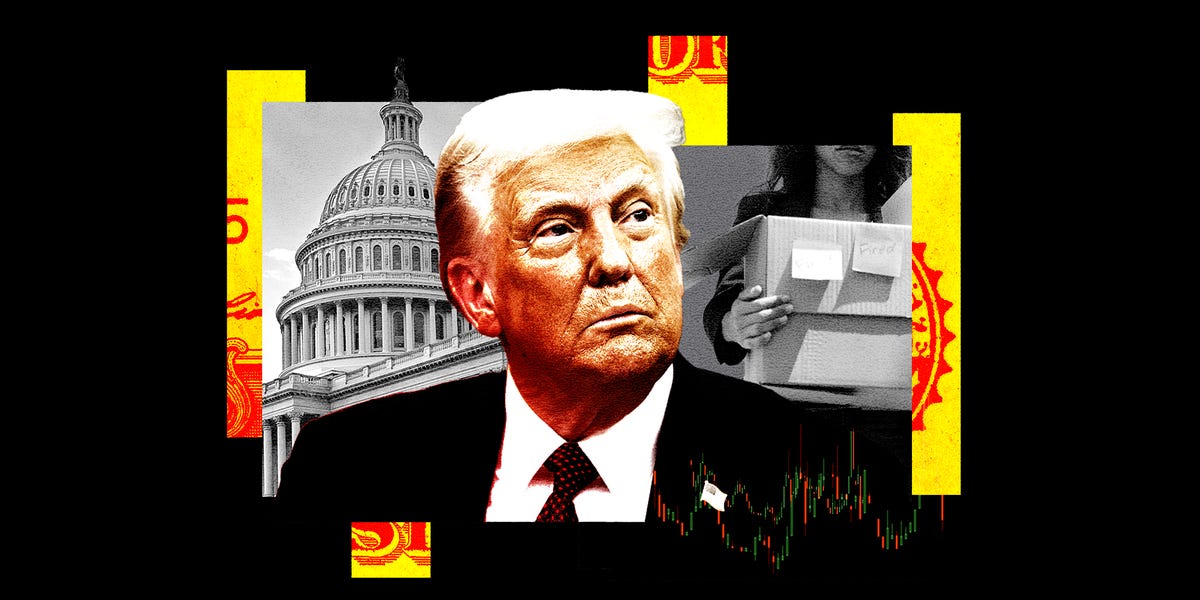Corporate America on Edge: Analyzing the Impact of Trump’s Policies
As former President Donald Trump re-enters the political arena, his controversial policies and approaches are sending ripples through corporate America. The business landscape is undergoing significant transformations, as leaders grapple with the implications of Trump’s policies ranging from AI regulation to tariff adjustments. This article delves into how these policies are reshaping the corporate environment and what it means for business leaders navigating this evolving landscape.
The Return of Trump: A New Era for Corporate America
Following his presidency, Trump’s influence on the political and economic landscape remains palpable. His return to the spotlight has reignited discussions on his previous policies and their implications for the future. Many corporate leaders are now contemplating how Trump’s return could affect their strategies and operations.
Trump’s Economic Policies: A Double-Edged Sword
Trump’s economic policies during his presidency were characterized by tax cuts, deregulation, and an America-first trade agenda. These initiatives aimed to stimulate economic growth, create jobs, and attract investments. However, they also introduced significant volatility and uncertainty for businesses.
For instance, the Tax Cuts and Jobs Act of 2017 provided corporations with substantial tax reductions, leading to increased capital investments and stock buybacks. Yet, the repercussions of such policies were mixed. While some companies thrived, others struggled to adapt to the rapid changes in trade policies and market dynamics.
One of the most defining aspects of Trump’s policies was his approach to international trade. The imposition of tariffs on a wide range of imports, particularly from China, has created a complex trade environment that businesses must navigate.
- Increased Costs: Businesses reliant on imported materials faced higher costs, impacting their profit margins.
- Supply Chain Disruptions: Tariffs forced companies to reassess their supply chains, seeking alternative sources or reshoring production.
- Market Uncertainty: The unpredictability of trade relations led to hesitancy among investors and business leaders.
As Trump outlines his new vision for trade, corporations are left on edge, weighing the potential benefits against the risks involved.
AI Regulation: The Future of Innovation
Another area where Trump’s policies could have a lasting impact is in the realm of technology and artificial intelligence (AI). As AI continues to advance, the need for regulation becomes increasingly important. Trump’s administration took a hands-off approach to technology, favoring innovation without excessive government oversight.
Balancing Innovation and Regulation
For corporate America, this poses a unique challenge. While many businesses advocate for limited regulation to foster innovation, there’s an underlying concern about ethical implications and accountability in AI development. The potential for misuse, bias, and privacy violations raises critical questions for business leaders.
- Ethical Considerations: Companies must navigate the moral implications of AI deployment, ensuring technology is used responsibly.
- Compliance Costs: Emerging regulations could lead to increased compliance costs, impacting profitability.
- Investment in Research: Businesses may need to invest more heavily in research to align their innovations with regulatory expectations.
As Trump re-engages with the political landscape, the discussion surrounding AI regulation will likely gain momentum, placing corporate America on high alert.
The Workforce Dilemma: Labor Policies and Immigration
Trump’s policies also extended to labor and immigration, affecting the workforce landscape in profound ways. His administration’s stance on immigration resulted in stricter policies, which have left many industries grappling with labor shortages.
Labor Shortages and Economic Growth
Industries such as agriculture, construction, and hospitality have been particularly hard hit by labor shortages. With a reduced influx of immigrant workers, many companies are struggling to fill essential positions, which can stifle economic growth and productivity.
- Wage Pressures: Businesses may have to raise wages to attract talent, impacting overall profitability.
- Increased Automation: Companies might turn to automation to compensate for labor shortages, which could lead to job displacement.
- Talent Retention: The competition for skilled labor has intensified, forcing companies to focus on employee retention strategies.
As Trump promotes his policies on labor and immigration, corporate leaders are left questioning how to adapt their workforce strategies to align with a potentially shifting regulatory environment.
Looking Ahead: Strategies for Corporate America
In light of these developments, how can corporate leaders prepare for the potential changes that Trump’s policies may bring? Here are some strategies that can help businesses navigate this uncertain landscape:
- Stay Informed: Keeping abreast of policy changes and potential impacts on your industry is crucial for strategic planning.
- Engage in Advocacy: Collaborating with industry associations can amplify your voice in discussions around regulation and policy.
- Embrace Innovation: Investing in R&D can help businesses stay ahead of the curve, particularly in technology and AI.
- Focus on Workforce Development: Training and upskilling existing employees can mitigate labor shortages and improve retention rates.
By proactively addressing these challenges, businesses can position themselves for success in an ever-changing economic environment.
As Trump re-enters the political discourse, corporate America finds itself on edge, grappling with the implications of his policies on the business landscape. From trade tariffs to AI regulation and workforce challenges, the evolving environment presents both risks and opportunities. By staying informed and adaptable, business leaders can navigate these changes and thrive in a dynamic economic landscape.
Ultimately, while uncertainty looms, the potential for innovation and growth remains. In a world shaped by shifting policies, the ability to pivot and embrace change will be a defining characteristic of successful businesses in the years to come.
See more Business Focus Insider Team

